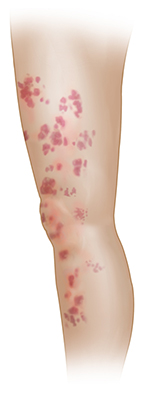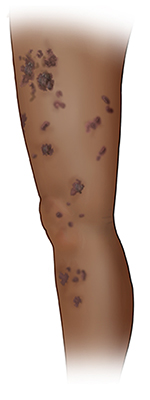Understanding Lichen Planus
Lichen planus is a noncanerous (benign), long-term (chronic) skin disease. This extremely itchy rash doesn't spread from person to person. It can be found anywhere on the body. But the rash is most often found on the wrists, arms, legs, scalp, and genitals. It may also be seen on the nails and in the mouth. Having it in your mouth can raise the risk of getting cancer in your mouth (oral cancer). People ages 30 to 60 are more likely to get lichen planus.
How to say it
LI-kehn PLAY -nuhs
What causes lichen planus?
The cause of lichen planus often isn't known. But metals, such as gold, may trigger it. So may some medicines used to prevent malaria or treat:
- High blood pressure
- Heart conditions
- Arthritis
Symptoms of lichen planus


- On the skin. Lichen planus causes very itchy, flat-topped bumps or patches to form. They're often a shiny red or purple color and straight-edged (polygonal), not round. They may also have fine white lines on them. Over time, the bumps may form thick patches of rough, scaly skin.
- In the mouth. The patches may look like white lace. Often, these patches don't cause pain.
- On the genitals. The skin here becomes bright red and raw. Sometimes sores can appear. These can make sex painful.
- On the nails. The nails can become thin, split, and grooved.
Treatment for lichen planus
Lichen planus often goes away in a few years. It may go away without treatment. To ease itching and improve the look of the rash, treatment may include:
-
Steroids. Depending on what type your healthcare provider prescribes, these medicines can be put directly onto the skin, injected into the affected area,or taken by mouth.
-
Other medicines. Your provider may give you other medicines to suppress the immune system. Or you may get medicines to ease itching and pain, such as an antihistamine or retinoid.
-
Phototherapy. This treatment directs ultraviolet light on the skin to help clear it.
Self-care tips for lichen planus
-
Don’t scratch any affected areas. This can sometimes spread the rash.
-
Use mild soap to bathe and moisturize with lotion afterward.
-
Take steps to reduce your risk of getting oral cancer:
- Don't smoke, chew tobacco, or drink alcohol.
- Get screened for oral cancer by a dentist or dermatologist every 6 to 12 months.
- Get a dental checkup and cleaning twice a year.
- Brush your teeth twice a day.
- Floss every day.
- Don't have foods or drinks that can make lichen planus in the mouth worse. This includes spicy foods, citrus fruits (such as oranges and grapefruits) and juices, tomatoes and foods made with tomatoes (such as salsa, pasta sauces, and ketchup), crispy and salty snacks (such as chips), and drinks that have caffeine (such as coffee, tea, and cola).
When to call your healthcare provider
Call your provider right away if you have any of these:
-
Fever of 100.4°F (38°C) or higher or as directed by your provider
-
New symptoms
-
Pain that gets worse
-
Symptoms that don’t get better or get worse
-
Mouth sores